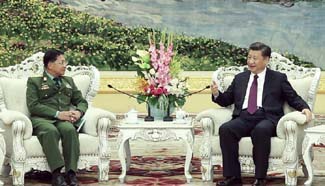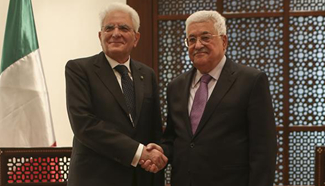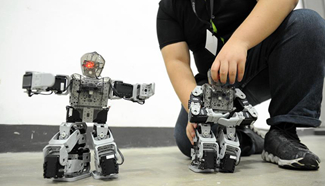RIGA, Nov. 1 (Xinhua) -- In Latvia, the Baltic nation more than 6,100 km away from China, Chinese language and culture are gaining traction, thanks to the continuous efforts of the country's sinologists over a century.
LATVIAN-CHINESE DICTIONARY
Peteris Pildegovichs, 78, a professor of Chinese and co-director of the Confucius Institute at the University of Latvia, recently attended the inauguration ceremony of an exhibition of Chinese paintings by Latvians in the National Library in Riga.
He took the opportunity to announce the publication of a Latvian-Chinese dictionary he compiled, which he hoped could assist more Latvians in learning the language.
In August, he received a publication award in Beijing for his dedication to compiling Chinese learning materials and dictionaries over the past decades.
The number of Latvians learning Chinese has seen a solid rise. Students and professionals alike are looking forward to mastering the language, some out of curiosity and interest, some for career prospects.
Sasha, 50, who works in a woodwork factory in Riga, said he began learning Chinese because he found the characters "interesting." Now he wants to look for a job in a Chinese company.
Although learning materials are easy to find online, Pildegovichs still felt it necessary to compile an authoritative dictionary for determined learners like Sasha.
ACADEMIC LEGACY
In this small eastern European country with a population of less than 2 million, sinology has a history of more than 100 years.
Studies on Chinese language and culture were introduced to Latvia at the beginning of the 20th Century by Peteris Smits (1869 -- 1938), according to historical records.
Smits compiled the first Chinese learning syllabus in Latvia, and translated the first Latvian book on China, a collection of ancient Chinese myths.
In 1919, he established a Sinology research unit at the University of Latvia, which was considered the foundation of Latvian-Chinese linguistics and Chinese-teaching in the country.
Smits' academic achievements were then inherited and expanded by Edgars Katajs, who was born in northeast China in 1923, and contributed tremendously to the translation of contemporary Chinese literature.
Having begun learning Chinese in 1964, Pildegovichs began his career as a Chinese teacher upon graduation. Many of his students now work as diplomats or scholars on China-related subjects.
In 2011, he co-founded the first Confucius Institute in Latvia, which now operates nine Chinese learning centers across the country.
Pildegovichs and his peer Jelena Staburova, a professor at the Riga Stradins University devoted themselves to Chinese history and philosophy studies, are known as the third generation of Latvian sinologists.
"I'll continue to work on Chinese teaching and contribute to the China-Latvia friendship," said Pildegovichs.
YOUNG GENERATION
Building on the past achievements of the pioneers, young Latvians have joined in the endeavor to promote mutual understanding between the two cultures.
For them, the unprecedented increase in political dialogue, trade and cultural exchanges between China and Latvia in recent years mean more opportunities and resources.
Staburova's daughter Una Berzina-Cherenkova, also a Chinese expert, now works as the director of the Confucius Centre at Riga Stradins University.
Kalina Jermaka, a young teacher at the University of Latvia, was recently elected chairwoman of an association for Latvian students who have studied in China.
"Chinese changed my life. I wouldn't be who I am today without learning the language," she told Xinhua.
One young Latvian woman met her husband in China.
After winning second place in an international Chinese speaking competition, Andzelina Cmirnova went to China to study in 2007.
After graduation, she became an actress and TV presenter in China, and tied the knot with her Chinese boyfriend.
Earlier this year Cmirnova was invited to speak about China at the University of Latvia where her journey began.
"It has been 10 years since I studied Chinese here. It felt like having a 'relationship' with the language, and now I want to spend the rest of my life with it," she said.











